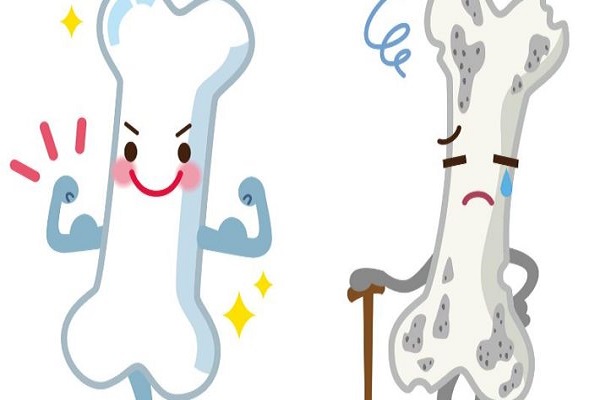Our bones are strongest at about age 30, and then begin to lose density. Keeping your bones strong is a smart goal at any age. There are plenty of steps you can take at home and with your doctor’s help to protect against painful fractures that can reduce your independence and, surprisingly, even increase your risk of dying due to medical complications.
You might not even realize you have osteoporosis until you have a fracture or an obvious change in posture. In fact, you could have significant bone loss without even knowing it. Back pain, caused by changes in the vertebrae, may be the first sign that something is wrong.
What Is Osteoporosis?
Osteoporosis means "porous bones." Our bones are strongest at about age 30, and then begin to lose density. More than 10 million Americans have osteoporosis, which is significant bone loss that increases the risk of fracture. About half of women 50 and older will have an osteoporosis-related fracture in their lifetime.

Mechanism of osteoporosis
Our bones are constantly being rebuilt throughout our lifetime. Bones are made up of collagen, a protein that provides the basic framework, and calcium phosphate, a mineral that hardens the bone. As we age, we lose more bone than we replace. Until about age 25, this project adds more new bone than it takes away, so bone density increases. From about age 25 to age 50, bone density tends to stay stable with equal amounts of bone formation and bone breakdown. After age 50, bone breakdown (resorption) outpaces bone formation and bone loss often accelerates, particularly at the time of menopause.

Until about age 25, this project adds more new bone than it takes away, so bone density increases.
How to Prevent Osteoporosis
As a Diet & Nutrition Counselor, I believe that Prevention not Cure should be the aim of most people in life. Let us look at some dietary and lifestyle changes that if made today can cut back your risk of Osteoporosis.

-
Have more Dairy
Have three servings of dairy every day. Milk products are an important source of calcium. Calcium is important for all age groups.
-
Calcium
At least 1,200 mg/day of calcium should be consumed daily, from either food and/or supplements. Levels greater than 2,500 mg/day are not recommended. Magnesium should also be taken with calcium, generally in a ratio of 2:1 calcium to magnesium. Calcium hydroxyapatite is very bioavailable and is the only form of calcium that promotes osteoblast (bone building) activity. To ensure adequate calcium absorption, a daily intake of 400-600 IU of vitamin D is recommended.
The best natural sources of calcium are milk, cheese, ice cream, yogurt, buttermilk and other dairy products. Other sources include salmon, green leafy vegetables, non-dairy almond drinks and tofu.
- Take Vitamin D along with your calcium regularly
-
Exercise
Exercise is an important component of an osteoporosis prevention and treatment program. Exercise not only improves your bone health, but it increases muscle strength, coordination, and balance, and leads to better overall health. Although exercise is good for someone with osteoporosis, it should not put any sudden or excessive strain on your bones. As extra insurance against fractures, your doctor can recommend specific exercises to strengthen and support your back. Exercise every day (like walking, swimming, etc.) regularly for about 30 minutes.
Exercise or Do Yoga regularly: There is no medicine invented yet that is better than physical exercise! Regular exercise strengthens the bones, improves flexibility and insures you against bone loss. Concentrate more on exercises that work out the long bones of your body such as the arms and legs. If you don’t like exercising or doing Yoga, walking is a safe and ideal exercise. Other exercises such as cycling, jogging, aerobics, pilates, power yoga and sports like tennis, squash and weight-lifting are other exercises that can prevent osteoporosis. If you have never exercised before or have gone for years without any physical activity, consult your doctor and get a full medical check up first.
-
Reduce Caffeine intake
Heavy tea and coffee drinkers generally lose more calcium from their body than those who are not addicted to coffee, tea and sodas.
-
Do Not Smoke
Smoking hampers calcium absorption and leads to long term leeching of calcium from the bones.
-
Limit Alcohol Intake
Like smoking, alcohol lowers calcium absorption into the body and damages the liver – which lowers calcium absorption even further.
-
Maintain an Ideal Body Weight Ratio
Now here’s some good news for those who are overweight! Excess fat places more stress on the bones which helps in the formation of new bone. Ideal weight and even some extra weight may protect you against osteoporosis. But then again, since being overweight can create countless other health problems, try to maintain your weight at recommended levels – not too high nor too low.
For example, avoid excessive use of alcohol, coffee, tobacco, etc., as they increase renal calcium excretion and reduce the absorption of calcium through the gastrointestinal tract (usually in men). Early treatment of chronic gastrointestinal diseases such as gastritis, chronic intestinal colitis, ... because the disease limits absorption of calcium, vitamin D, Protid, ....
If you apply the right and adequate measures early, it is best from after age 30, surely you will have a strong body supple and contributes to longevity. And to get more knowledge of joint bone protection, join the seminar on the topic: "Osteoporosis and osteoarthritis" held at City International Hospital.
Health seminar: "Osteoporosis and osteoarthritis".
Event information
Special offers
To register
|
- Address: No. 3, 17A Street, Binh Tri Dong B Ward, Binh Tan Dist. (Next to AEON Mall Binh Tan). Ho Chi Minh City.
- Website: https://cih.com.vn/en/
- Email: This email address is being protected from spambots. You need JavaScript enabled to view it.










